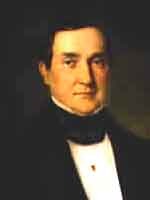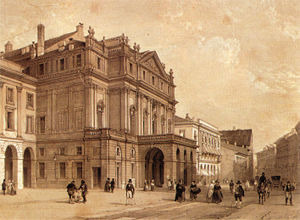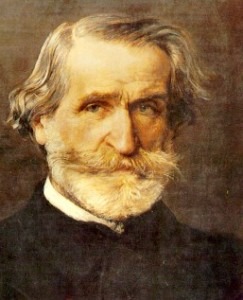
Bartolomeo Merelli
Credit: Wikipedia
Merelli was born in Bergamo, the Lombard city which also happened to produce many of the greatest composers and singers of the era. In his hometown, he studied under the German composer Giovanni Simone Mayr, initially contemplating a career as a musician. He first made his mark as a librettist, writing for his Bergamasc colleague Gaetano Donizetti, as well as Mayr, Nicola Vaccai and others. In 1830 Merelli entered the murky world of impresarios by taking over the impresa at the small theatre of Varese. In 1836, Merelli had his big break when he won the concession for Milan’s Teatro alla Scala, which he held on to until 1850.
While that theatre was the most important house of Northern Italy, it didn’t enjoy the legendary status in Italian opera that the Teatro San Carlo of Naples commanded at the time. It was Merelli’s drive, perspicacity and nose for compositorial talent that turned La Scala into the leading house of Italy, largely thanks to the discovery of Giuseppe Verdi, and the resulting artistic cooperation between the two men. Their professional relationship – while often tumultuous and even hostile – was to last several decades.

La Scala
Credit: Wikipedia
Nabucco – Hebrew Slaves Chorus
But it was Merelli who then helped Verdi out of his rut, passing him the libretto for Nabucco, which not only re-inspired the composer, but landed him his first big success, in 1842. The chorus of the slaves, Va Pensiero, became an anthem for the Italians struggling against their Austrian oppressors, and catapulted Verdi to national fame. Merelli also cast the soprano Giuseppina Strepponi, who would go on to become Verdi’s second wife. The impresario would later commission and launch I Lombardi and Giovanna d’Arco from Verdi, but relations broke down thereafter over disputes regarding copyrights, and Merelli would not launch another Verdi opera.
Pavarotti, Ramey, Flanigan – I Lombardi – Trio: Qual voluttà trascorrere

Giuseppe Verdi
Credit: http://www.iconsofeurope.com/
Like Domenico Barbaja or Alessandro Lanari before him, Merelli ran an artist management business, notably working with the legendary Maria Malibran, and organized several successful tours. He also shared their taste for excess, acquiring expensive art and over a dozen English thoroughbreds.
In spite of his many achievements and his much lauded cultural education, Merelli’s legacy was mixed because he found the commercial aspects of running a business challenging. After overspending and running an excessive number of theatres, Merelli finally ran out of money and died impoverished in his hometown of Bergamo. Like most of the other great impresarios, this Eagle had also crashed.

